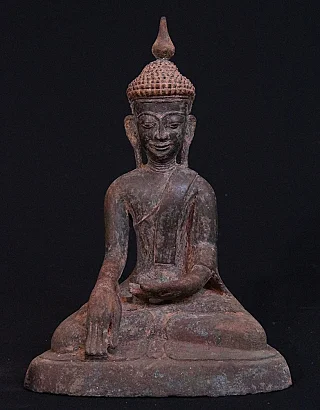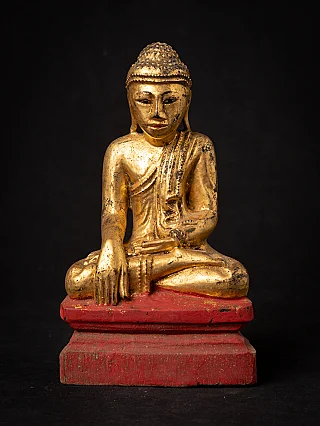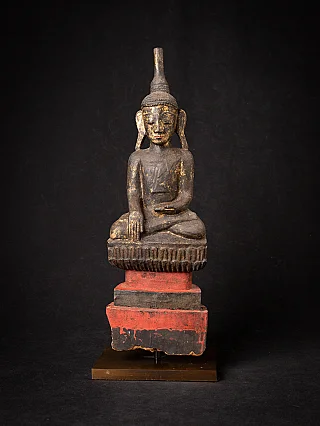Nagarjuna - Founder of Madhyamaka
Author : Peter Vredeveld

Nagarjuna, the most significant Buddhist philosopher, was also considered the king of Nagas.
Nagarjuna, renowned as one of the most significant figures in Buddhist philosophy, stands tall as the greatest philosopher after Lord Buddha. His foundational role in establishing the Madhyamika School marked a pivotal era in the development of Mahayana Buddhism. Under Nagarjuna's stewardship, this school became a bastion of Buddhist thought and scholarship. His seminal work, Mula-Madhyamaka-karaka, or "Fundamental Verses on the Middle Way," is a cornerstone in Buddhist literature, offering profound insights into Buddhism's core teachings.
In Mahayana Buddhism, Nagarjuna's portrayal transcends that of a mere scholar; he is viewed as a monumental, almost mythical figure, often depicted with naga serpent-like characteristics. This portrayal signifies his deep connection with the naga serpents and the mystical aspects of Buddhist lore. Nagarjuna's journey from his origins in a Brahmin family to his transformation into a revered Buddhist monk encapsulates his profound spiritual quest and significant contributions to Buddhist philosophy.
Nagarjuna's Philosophical Contributions

Nagarjuna's philosophical legacy is central to Mahayana Buddhism, especially his groundbreaking exploration of Sunyata or "emptiness." This concept redefined Buddhist thought by harmonizing critical doctrines such as Anatman ("not-self") and Pratityasamutpada ("dependent origination"), positing that all entities, devoid of intrinsic nature, exist in a state of interdependence. This revolutionary view challenged conventional perceptions of reality and offered a new lens to understand the Buddha's teachings.
His conceptualization of the Two Truths doctrine further elucidates the Buddha's teachings. This philosophical framework differentiates between relative truth—the empirical, everyday reality—and absolute truth, referring to the ultimate reality characterized by Sunyata. This distinction has been fundamental in Buddhist philosophical discourse, guiding practitioners to understand and apply Buddhist teachings.
Nagarjuna and the Nagas: A Legendary Encounter
The mystical narrative of Nagarjuna's interactions with the Nagas, serpent-like beings from Buddhist and Hindu mythology, is a fascinating facet of his legacy. According to traditional accounts, the Nagas were guardians of profound Buddhist teachings, which they had hidden away from the world. The Nagas chose Nagarjuna to receive these teachings, thus instrumentally reintroducing them to the human realm. The texts, known as the Wisdom Sutras, form part of the expansive Prajnaparamita Sutra, a collection central to understanding the profundity of Buddhist wisdom. This encounter highlights Nagarjuna's unique position in Buddhist history, bridging the human and the mythical and playing a pivotal role in preserving and disseminating Buddhist teachings.
The Foundational Role of the Madhyamaka School
The Madhyamaka School, established on the philosophical foundations laid by Nagarjuna, stands as a cornerstone of Mahayana Buddhism. Its teachings, deeply rooted in the concept of emptiness, emphasize the intrinsic lack of independent, inherent existence in all phenomena. Nagarjuna's philosophical insights encourage practitioners to look beyond the superficial appearances of things and recognize the interconnected, impermanent nature of all existence. This school's perspective on reality has profoundly influenced Buddhist thought and practice, encouraging a more profound exploration of fact, reality, and enlightenment.
"Whatever is dependent arising; We declared that to be emptiness. That is a dependent designation, and it is the middle way."- Nagarjuna
Madhyamaka's emphasis on dependent origination and emptiness has enriched Buddhist philosophical discourse and had practical implications for Buddhist meditation practices and ethical conduct.
Impact on Later Buddhist Traditions and Thought
Nagarjuna's influence extends well beyond the Madhyamaka School. His teachings on Sunyata and the nature of reality have deeply impacted various Buddhist traditions and practices, such as Zen Buddhism and Tibetan Buddhism. His philosophical insights have been instrumental in shaping the understanding of core Buddhist concepts, such as the Four Noble Truths and the Noble Eightfold Path. These insights provide a more nuanced interpretation and application of these teachings in the context of Mahayana Buddhism. Nagarjuna's legacy inspires Buddhists and scholars worldwide, offering a path to deeper understanding and spiritual realization. His teachings on emptiness, in particular, have been critical in developing Buddhist meditation techniques and cultivating wisdom and compassion in Buddhist practice.
Nagarjuna's Writings and Their Influence
Nagarjuna's writings, notably the Mula-Madhyamaka-karaka, have served as foundational texts in the Madhyamaka School and across Mahayana Buddhism. These writings delve into complex philosophical discussions, exploring the nature of reality, the concept of emptiness, and the interdependent nature of all phenomena. His approach to these profound topics has been characterized by a unique blend of logical rigor and deep insight, making his works a subject of study and contemplation for centuries. Nagarjuna's influence on Tibetan Buddhist leaders, like the Dalai Lama, and his impact on the development of Buddhist philosophy and practice in Tibet, China, Korea, Japan, and beyond are testimony to his enduring legacy in the Buddhist world.
In conclusion, Nagarjuna's contributions to Buddhism are vast and multifaceted. His philosophical insights, legendary encounters, and foundational texts have shaped the course of Buddhist thought and practice for millennia. His teachings resonate with Buddhists and scholars alike, offering profound insights into the nature of reality, the path to enlightenment, and the interconnectedness of all beings.
Share this page














































